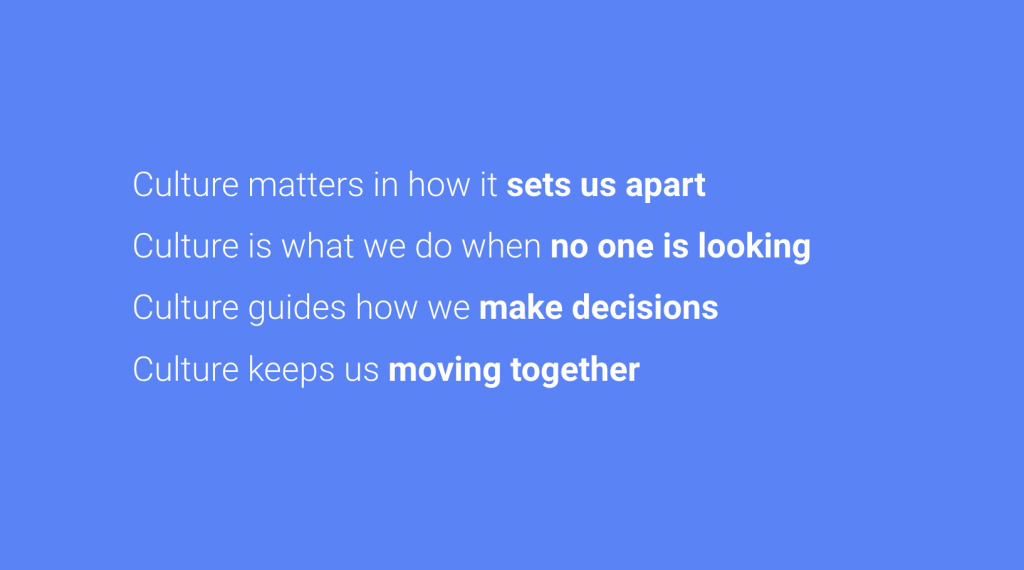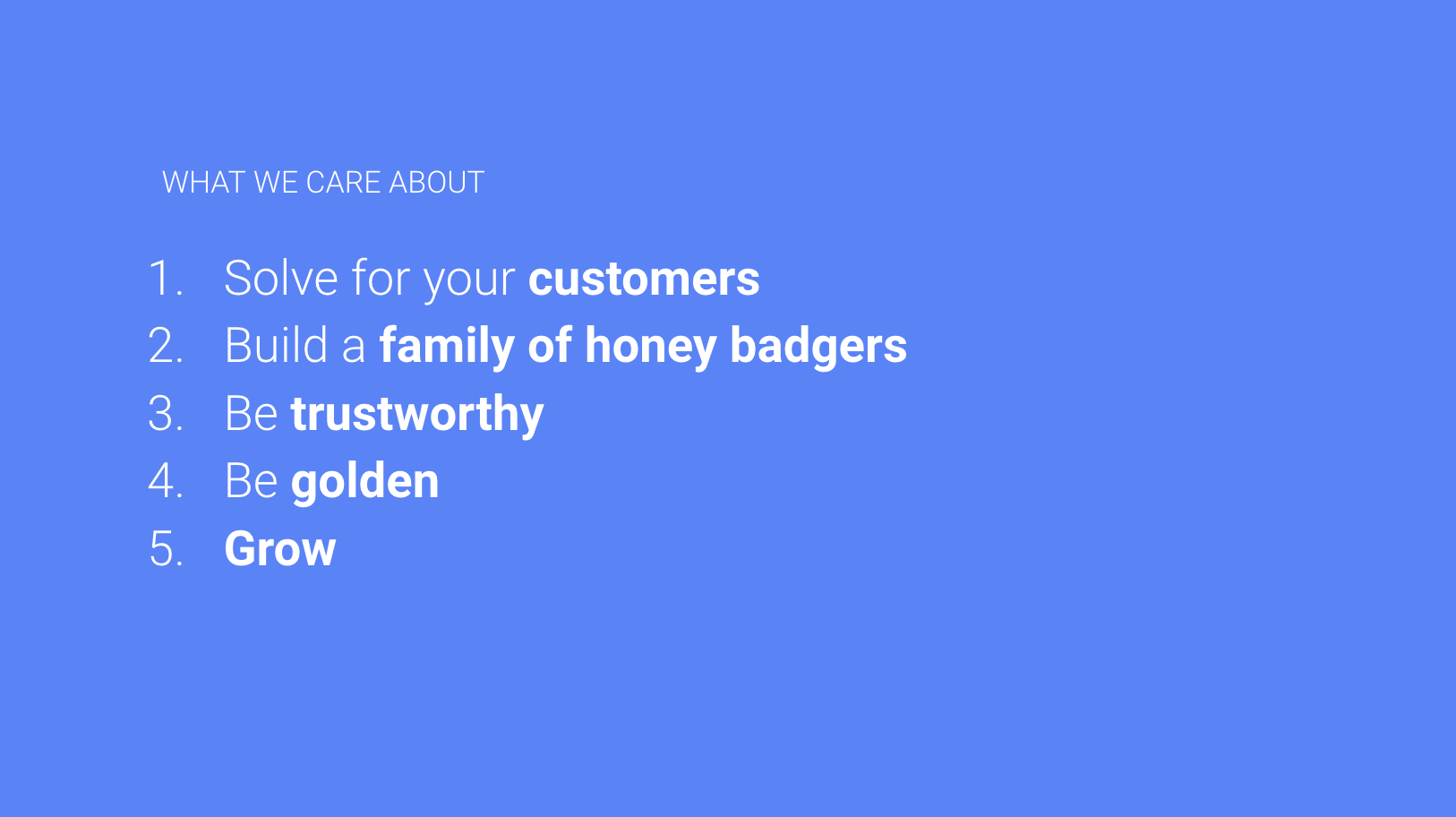Probably useful to start with defining what our culture is. Then let’s talk about how we assess for it.

There’s a few ways to think about culture. From a bunch of different readings I like some of the statements above.
Culture matters inasmuch as it’s different from others. Everyone can say “integrity” which doesn’t mean anything. So we look for attributes that are truly different from others in our market. Lots of examples in our 5 cultural traits below.
Culture is what we do when no one else is looking. It means this is fundamentally who we are. It’s what is unavoidable about what makes our pscyhe – good and bad.
Culture is how we make decisions. It’s the small decisions we make in what we reward and punish. It’s also the big decisions we make about how the company moves. It’s who we fire and hire.
Culture keeps us moving together. One founder said it’s the operating system of the organisation. It’s how we communicate and the shared traditions we share. Is our common history, the legends that form our past and the united call that forms our future.
Vague I know, we’re about to get real.
Xendit culture

- Solve for your customers – this means we build, optimise for and think about things from their point of view. For example, the easiest way to win an argument at Xendit about product build is to bring a customers’ opinion, or 10. Internally, we expect HR to think about their roles at talent retention, with the talent as the customer.
- Build a family of honey badgers – we really like the “honey badger” moniker. It’s a tough little creature that refuses to die. It’s audacious and will fight lions (significantly bigger foes), charge into a bees nest and will fight snake, get bitten, pass out, wake up and fight the same snake again.
We also like the family idea. We tend to actually care about each other more than most companies do. - Be trustworthy – trust is an important currency here. We give out more trust than other organisations on day 1. That’s great. But if you prove us wrong in our trust, you’ll find that it’s hard to re-attain.
- Be golden – do to others as you would have them do to you. It’s a great absolute guideline which allows for multiple subjective answers. For example, in our firing we’re very purposeful about how we treat those people.
- Grow – growth is life as a startup. Most people join Xendit to learn so optimise for growth for ourselves, our teams and the company.
Assessing for culture
I think the litmus test for the culture attributes is would you be willing to be stuck in an airport for that person for 12 hours. Other variants are a desert island, or would you want this person on your team.
Things we don’t tolerate
Here are a few traits that would make me consider a culture veto:
- Lack of integrity, e.g. lying – if someone is willing to lie in an interview they are going to be a negative ROI for the organisation. They’ll lie internally, externally and eventually it’ll come back. Recently, I had a candidate who over exaggerated their contributions and why they were no longer at their previous work places. Their story didn’t match their references.
- Willingness to complain about others – if someone is willing to gossip about others in an interview (typically stressful situation with relative stranger) they’ll likely be willing to do about us at another stage. I expect that candidates not gossip about their bosses or previous workplaces. Even if they violently disagree, there are professional ways to explain those.
- Focus on self, e.g. “I” when things go well and “they” when things aren’t going well – this is extremely selfish behaviour which will be indicative of how they’ll function in a team. I wouldn’t want this person on my team. If they’re like this now, they’ll likely be like this when they join.
- Cockiness – I can’t stand this, especially when they can’t back it up. Very rarely is a single person responsible for amazing amounts of success. Good leaders should shine a light on their direct reports. Direct reports should shine a light on their managers and team. This is a team game so we want people who want to play a team game.
- Dickheads – a relative measure but many companies are adopting a “no dickhead policy”. I think this makes a tonne of sense.
- References – I try to find references off the resume. If they’re in startups we normally can find someone who knows about them. Any hesitation is a yellow flag at minimum.
Feel free to pick some of these that resonate with you and test for them.
Testing for culture
Some techniques for testing for culture
5 Whys
This is a technique to keep asking the same question in slightly different ways or just probing for more detail: Tell me about a time when you had a conflict? Why did you take those actions? What was your boss’ reaction? What did you do then? Why you’d do that? Hmmm, I would have handled it differently. Why didn’t you do X? Why did you choose to write him an email rather than call or in person? Why did you then phrase it that way? Just go down that rabbithole.
Most people only practice for 1 or 2 “whys” max. So the truth comes out after. And if you probe with a potential disagreement you can see if they’ve actually learnt anything from the situation or they just reciting a rehearsed answer.
In a recent example, they suggested that a project was stopped because it was mutually beneficial for their company and the partner. The 2nd why produced that it was a decision by weighing ROI. This is all rehearsed rubbish. The 3rd why then produced that the candidate disagreed with the leader to end the project. The 4th why produced that the candidate blames the partner for not willing to put resources towards the project. The 5th why was a not well thought answer about partner not having devs. I disagreed and said partner normally has good reasons and if there was traction they would have put resources. The candidate retorted and said the partner had little vision what should be accomplished.
They say you can predict 90% the success of a marriage by looking for “contempt” in the body language of a couple during an argument. What I heard here was contempt and a very quick call to blame a boss and partner. To me if someone with 20+ years tech experience and a nationally renowned partner’s founder decide something is not worth it, there is something else. The lack of answer says to me that they haven’t a) internalised the issue well enough to reflect on the answers and b) maybe consider it not their fault and so haven’t dug deep to examine what they could haven’t done better.
Red flags
There’s a few red flags in how people talk as they chat with you. Here are some I’ve seen recently:
- Continuing making bad decisions or working with low quality people – we’ve had a few people we’ve wooed who continue to choose sucky situation after sucky situation, i.e. poor life choices. I’m fine if you’ve made 1 bad mistake in employers or founders to work with. An example is someone who was a startup founder and has failed a few times. When I dug deeper, this candidate always was trying to do 3 businesses at once – they may not have called it that but words like “I love the side hustle” and “I’m purely the ideas person, I’m not an executor” are huge red flags. They’re not reflecting about their failures and what to change.
- “I” not “we”. I forget the science but someone who talks in terms of “I” all the time is generally most individualistic than someone who thinks about their team. Rarely is a single person responsible for huge success so someone who tries to claim all the credit is probably overselling. Also, I would likely hate to work with a person who claimed credit for everything.
- Late to interview. People should be on time. They should plan ahead. We do give more leeway given it’s Jakarta. In fact, we’ve given leeway when someone has missed their flight. But we expect people to be honest. A legend surrounding Xendit is that someone arrived for an interview 10 min late but soaking wet. They said they just misjudged time but ran in the rain to make the last leg of the trip – that person got through to the next round.
